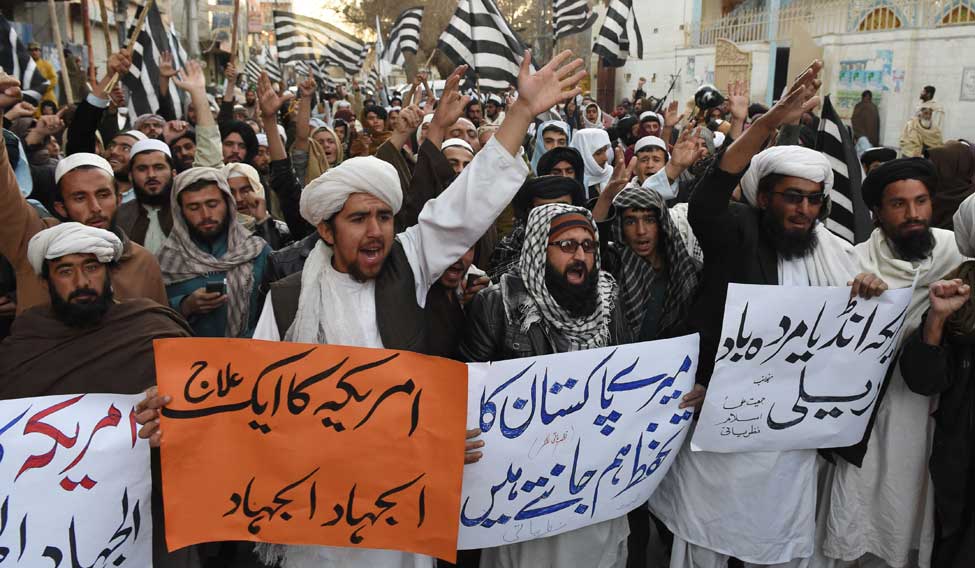Terror attacks in Kabul, alas, have become a familiar pattern in the blood-splattered security narrative of Afghanistan. The January 4 attack at a police station, the responsibility for which was claimed by the Islamic State, took the lives of 11 innocents. The incident occurred within the first week of the new year pointing yet again to the tenacity of the terrorism challenge that the region and the global community have to grapple with 17 years after the enormity of 9/11.
The decision of the Trump administration to suspend all security-related aid to Pakistan that could affect as much as USD 1.3 billion, announced on the same day, is indicative of the downgrading of the very opaque, complex, contradictory and troubled bi-lateral relationship that Washington has with Islamabad. The decision also included another reprimand―the inclusion of Pakistan in a watch-list for violation of religious freedom.
 C. Uday Bhaskar
C. Uday Bhaskar
The decision to turn the heat on Pakistan over its duplicity in the war on terror was already conveyed as unambiguously as is possible in the first tweet of 2018 that President Donald Trump launched when he warned: "The United States has foolishly given Pakistan more than 33 billion dollars in aid over the last 15 years, and they have given us nothing but lies & deceit, thinking of our leaders as fools. They give safe haven to the terrorists we hunt in Afghanistan, with little help. No more!"
Do these early 2018 developments represent a major shift in US policy towards Pakistan? While the Trump tweet is a highly visible and unorthodox means of conveying decades-old American frustration with the duplicity associated with Rawalpindi (GHQ of the Pakistan army), it may be assumed that the US will maintain the core continuity in its Pakistan policy, which is to remain engaged and use the fiscal aid as a leverage to ensure compliance by its most mendacious ally. Perhaps, downgrading would be a more appropriate word to describe the current public reprimand and US assertion in relation to Pakistan.
The impact of the Trump tweet in Pakistan has been predictable. The nationalist sentiment is aggrieved and the honor brigade has denounced the US in public―on TV, social media and elsewhere. A late night demarche has been served on the US ambassador and a minister has questioned the veracity of the 33 billion dollar figure, adding that the White House could appoint a certified accountant to crunch the aid numbers―and the barb was that this would be at Pakistani expense!
However, both Rawalpindi and the Pentagon are aware that Pakistan is not devoid of its own leverages apropos the USA. The presence of American personnel in Afghanistan is a vulnerability that Pakistan has exploited in the past and can do so again. But Islamabad is acutely aware of the penalties that will accrue in the political and diplomatic domain if it decides to buck the USA beyond a point. A high percentage of the Pakistani elite and their immediate family live/work/study in the western block (North America and EU) and an irrevocable split with Washington is a low probability exigency.
Should India take advantage of this development and gloat over Pakistani discomfiture? Short answer, no. US-Pakistan relations have a roller-coaster element and the manner in which the current American initiative plays out must be monitored―quietly. The steadfast Indian objective ought to be to ensure Rawalpindi compliance with the January 2004 Vajpayee-Musharraf agreement, wherein Pakistan would desist from supporting or allowing any kind of terror activity against India. This has been elusive for 14 years and it would be imprudent to infer that one tweet will make the substantive difference that is being sought. It merits recall that the entire US policy focus is on the Pak support to terror groups in Afghanistan while those targeting India are in a different basket.
The immediate poltico-diplomatic fallout has been the manner in which Beijing has rushed to support Pakistan over the support to terrorism. The US reprimand has been rejected and China has again drawn attention to Pakistan as a terror victim. This is a selective approach and is no surprise. But it is unlikely that Beijing will replace the US as a major financial aid provider, with no strings attached. May be a long term loan such as for the Belt and Road Initiative mega project, but 33 billion dollars in aid which accommodates embedded duplicity (AQ Khan, Daniel Pearl, Osama bin Laden et al) that is akin to biting the hand that feeds will be a non-starter for China.
May be Islamabad is drafting its own tweet, in which case, the world will see twiplomacy displacing old-fashioned diplomacy. That is if Trump survives the Bannon disclosures!
Bhaskar is director, Society for Policy Studies, New Delhi
Disclaimer: The views expressed in this article are solely those of the author and do not necessarily represent the views of the publication





